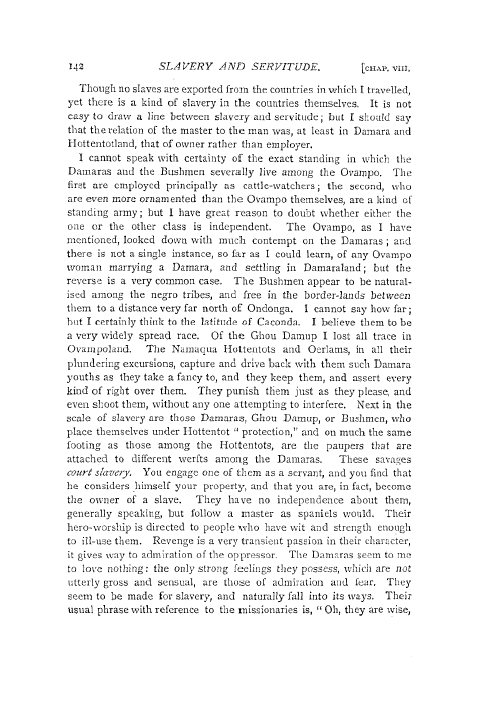142 SLAVERY AND SERVITUDE. [crr.cp. vnl,
Though no slaves are exported from the countries in which I travelled, yet there is a kind of slavery in the countries themselves. It is not easy to draw a line between slavery and servitude; but I should say that the relation of the master to the man was, at least in Damara and Hottentotland, that of owner rather than employer.
I cannot speak with certainty of the exact standing in which the Damaras and the Bushmen severally live among the Ovampo. The first are employed principally as cattle-watchers; the second, who are even more ornamented than the Ovampo themselves, are a kind of standing army ; but I have great reason to doubt whether either the one or the other class is independent. The Ovampo, as I have mentioned, looked down with much contempt on the Damaras ; and there is not a single instance, so far as I could learn, of any Ovampo woman marrying a Damara, and settling in Damaraland; but the reverse is a very common case. The Bushmen appear to be naturalised among the negro tribes, and free in the border-lands between them to a distance very far north of Ondonga. I cannot say how far; but I certainly think to the latitude of Caconda. I believe them to be a very widely spread race. Of the Ghou Damup I lost all trace in Ovampoland. The Namaqua Hottentots and Oerlams, in all their plundering excursions, capture and drive back with them such Damara youths as they take a fancy to, and they keep them, and assert every kind of right over them. They punish them just as they please, and even shoot them, without any one attempting to interfere, Next in the scale of slavery are those Damaras, Ghou Damup, or Bushmen, who place themselves under Hottentot "protection," and on much the same footing as those among the Hottentots, are the paupers that are attached to different werfts among the Damaras. These savages court slavery. You engage one of them as a servant, and you find that he considers himself your property, and that you are, in fact, become the owner of a slave. They have no independence about them, generally speaking, but follow a master as spaniels would. Their hero-worship is directed to people who have wit and strength enough to ill-use them. Revenge is a very transient passion in their character, it gives way to admiration of the oppressor. The Damaras seem to me to love nothing: the only strong feelings they possess, which are not utterly gross and sensual, are those of admiration and fear. They seem to be made for slavery, and naturally fall into its ways. Their usual phrase with reference to the missionaries is, " Oh, they are wise,

